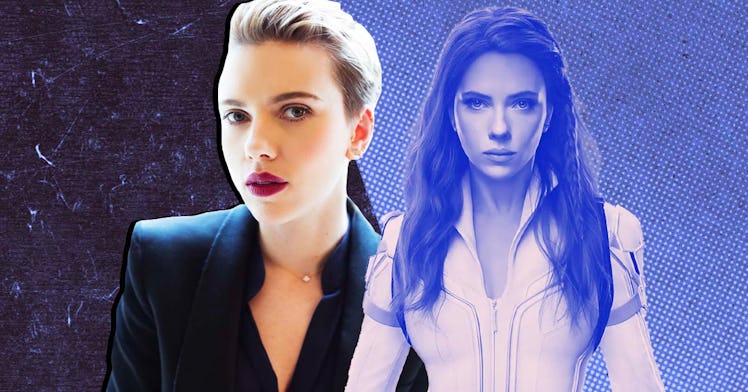Scarlett Johansson Says Goodbye to ‘Black Widow’
Johansson says Natasha's "integrity" is just what young girls need right now.

Scarlett Johansson is one of the most direct, blunt, forthright people on the planet. Trust us. We’ve met her. Multiple times. She sets her limits. She knows her boundaries and makes sure you do, too. She doesn’t veer from them. And it’s utterly fitting that her most iconic role is that of the trained assassin and spy Natasha Alianovna Romanoff, better known as Black Widow, a leader of the Avengers. After numerous delays related to COVID-19, the titular origin story finally opens this Friday, both in theaters and streaming on Disney Plus.
Johansson’s Natasha is as adept at hand-to-hand combat as she is at reading people, figuring out what makes them tick, and instinctively knowing whom to trust. Or maybe not. Without getting into any spoilers, the film, directed by Australian Cate Shortland, is a multi-layered family saga and a deeply resonant feminist fable that also happens to feature superheroes.
As for Johansson, a Tony and BAFTA winner and two-time Oscar nominee, making Black Widow felt both deeply gratifying and daunting, in the best ways possible. The mom of daughter Rose (with another baby on the way, reportedly, with husband Colin Jost), talks to Fatherly about role models, being part of the Avengers, and what’s next for Black Widow.
My son and I watched the movie last night and it was revelatory. It’s so multi-layered, so complex, so unexpected. And a woman directed it. Who knew women could direct superhero movies?What was the filming process like for you, from character development on down?
The process of making Black Widow, it was very different. It’s the first film that I’ve produced and my experience, really from conception to what you guys are all seeing now — was absolutely fulfilling and creatively fulfilling, and also personally, really just very fulfilling. Everything was possible because strangely, you would think that the timeline would be sort of limiting in a way, because you were kind of going backwards, but because of Natasha’s ultimate fate, it actually made it in some ways daunting, but it felt limitless in some ways.
Because it didn’t have to lead us anywhere. It wasn’t like we had to tie up a bunch of loose ends, or we were introducing another kind of storyline or multi-verse or anything like that. We could really make it very much about her person and her own personal journey.
Are you done with Black Widow and the Avengers?
I have no plans to return as Natasha. I feel really satisfied with this film. It feels like a great way to go out for this chapter of my Marvel identity. I would love to be able to continue to collaborate with Marvel in other ways because I think there’s just an incredible wealth of stories there. Re-imagining this genre is something that I find very interesting. I think there’s a lot of opportunities to tell these stories in different ways than audiences have come to expect.
You’ve spoken in the past about how sexualized Black Widow was in earlier films. That’s not remotely the case in this movie.
After Iron Man to going into Avengers, there’s been an evolution of her look. I think part of that is just gaining the trust of the executives at Marvel and kind of sitting in the character and just being able to make decisions for her. That really happened fairly early on. I mean, in Iron Man 2, I worked with the amazing incredible costume designer Mary Zophres, who created an absolutely beautiful femme fatale look for the character. And it was very stunning.
In some says I look at it as a costume she was wearing — at the time, Marvel was interested in the character being a shape-shifter. When we were doing Captain America: The Winter Soldier — this is a really funny thing — the look is fantastic and utilitarian. She first drives up in this beautiful car and picks up Cap, and initially in the script, it was like, she arrives in her tennis whites, with a blonde wig. It was very quickly killed.
You work with a lot of male writers. Things were shifting. You have to be a part of the change. Audiences are also demanding stuff and there’s a cultural shift and it feeds everything into a more progressive direction. It’s been a process, it’s been a process.
What makes Black Widow a role model for children, and girls in particular? We don’t see too many women like her headlining major tentpole summer movies.
One of her most admirable attributes is that she’s not afraid to admit when she’s wrong. She takes responsibility for things, particularly in this film. She’s really coming to terms with her past in a way that is very, very mindful, very thoughtful, and considerate, and mindful. And I think she’s someone who has a lot of respect for other people. She has a lot of integrity as a person, and I think that makes her a great role model for children and certainly for young girls.
She acknowledges the pain that she’s caused or just that someone else has actually experienced pain. That’s really powerful to say: I see that you’re hurting. That’s such a huge step for a person to make. It’s something I try to teach my daughter. It’s complicated, of course, when kids are little, but she’s a compassionate person.
Black Widow streams July 9 on Disney Plus.